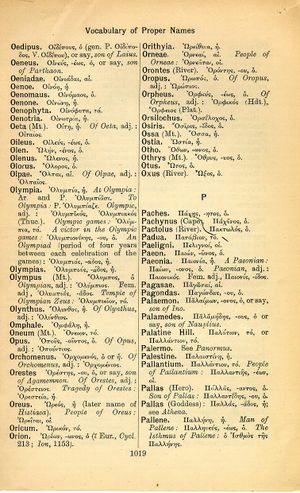Otho: Difference between revisions
Ὁ πολὺς ἄκρατος ὀλίγ' ἀναγκάζει φρονεῖν → Multum meracum pauca sapere nos facit → Nur wenig denken lässt viel ungemischter Wein
(6_11) |
(D_6) |
||
| Line 4: | Line 4: | ||
{{Lewis | {{Lewis | ||
|lshtext=<b>Ŏtho</b>: ōnis, m., = Ὄθων,<br /><b>I</b> a Roman [[surname]].<br /><b>I</b> L. [[Roscius]] [[Otho]], a [[knight]], a [[friend]] of [[Cicero]], and [[author]] of the [[law]] [[that]] the knights should [[occupy]] the [[first]] [[fourteen]] seats in the [[theatre]] [[next]] to the [[orchestra]], Cic. Mur. 19, 40; cf. Ascon. ad Cornel. p. 79 Orell.—Hence, sic libitum [[vano]], qui nos distinxit, Othoni, Juv. 3, 159.—<br /><b>II</b> M. Salvius [[Otho]], a Roman [[emperor]], whose biography is given by [[Suetonius]]: [[mollis]] [[Otho]], Mart. 6, 32, 2; Juv. 2, 99.—Hence,<br /> <b>B</b> Ŏthōnĭānus, a, um, adj., of or belonging to the [[emperor]] [[Otho]], Othonian: Othoniani duces, of the [[emperor]] [[Otho]], Tac. H. 2, 24: partes, id. ib. 2, 33. | |lshtext=<b>Ŏtho</b>: ōnis, m., = Ὄθων,<br /><b>I</b> a Roman [[surname]].<br /><b>I</b> L. [[Roscius]] [[Otho]], a [[knight]], a [[friend]] of [[Cicero]], and [[author]] of the [[law]] [[that]] the knights should [[occupy]] the [[first]] [[fourteen]] seats in the [[theatre]] [[next]] to the [[orchestra]], Cic. Mur. 19, 40; cf. Ascon. ad Cornel. p. 79 Orell.—Hence, sic libitum [[vano]], qui nos distinxit, Othoni, Juv. 3, 159.—<br /><b>II</b> M. Salvius [[Otho]], a Roman [[emperor]], whose biography is given by [[Suetonius]]: [[mollis]] [[Otho]], Mart. 6, 32, 2; Juv. 2, 99.—Hence,<br /> <b>B</b> Ŏthōnĭānus, a, um, adj., of or belonging to the [[emperor]] [[Otho]], Othonian: Othoniani duces, of the [[emperor]] [[Otho]], Tac. H. 2, 24: partes, id. ib. 2, 33. | ||
}} | |||
{{Gaffiot | |||
|gf=<b>Ŏthō</b>,⁸ ōnis, m. (Ὄθων), surnom romain ; not<sup>t</sup> : L. [[Roscius]] Othon [tribun de la plèbe, qui fixa la place des chevaliers au théâtre] : Cic. Mur. 40 || M. [[Salvius]] Othon [qui détrôna [[Galba]] et fut vaincu par [[Vitellius]] : Mart. 6, 32, 2 ; Juv. 2, 99 || <b>-nĭānus</b>, a, um, d’Othon : Tac. H. 2, 24 || subst. m. pl., les soldats d’Othon : Tac. H. 1, 34. | |||
}} | }} | ||
Revision as of 06:59, 14 August 2017
English > Greek (Woodhouse)
Ὄθων, -ωνος, ὁ.
Latin > English (Lewis & Short)
Ŏtho: ōnis, m., = Ὄθων,
I a Roman surname.
I L. Roscius Otho, a knight, a friend of Cicero, and author of the law that the knights should occupy the first fourteen seats in the theatre next to the orchestra, Cic. Mur. 19, 40; cf. Ascon. ad Cornel. p. 79 Orell.—Hence, sic libitum vano, qui nos distinxit, Othoni, Juv. 3, 159.—
II M. Salvius Otho, a Roman emperor, whose biography is given by Suetonius: mollis Otho, Mart. 6, 32, 2; Juv. 2, 99.—Hence,
B Ŏthōnĭānus, a, um, adj., of or belonging to the emperor Otho, Othonian: Othoniani duces, of the emperor Otho, Tac. H. 2, 24: partes, id. ib. 2, 33.
Latin > French (Gaffiot 2016)
Ŏthō,⁸ ōnis, m. (Ὄθων), surnom romain ; nott : L. Roscius Othon [tribun de la plèbe, qui fixa la place des chevaliers au théâtre] : Cic. Mur. 40

